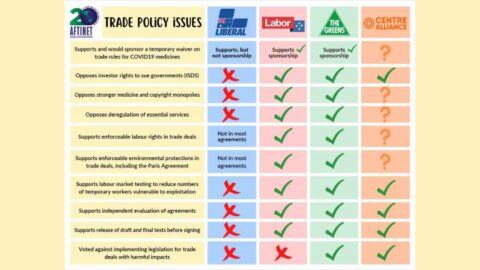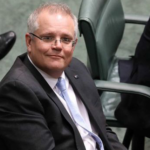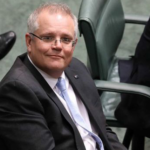Rights-Based NGO Rates Political Parties on Trade Justice

Investor-state dispute settlement (ISDS) is a mechanism often incorporated into free trade agreements, which provides corporations with specific rights that allow them to sue governments if their business interests are affected by decisions made by local authorities that are adverse to them.
Since coming to government in 2013, the Liberal Nationals has generously been incorporating these ISDS rights into multiple free trade agreements, including the Trans Pacific Partnership (TPP-11), and bilateral agreements with China, South Korea, Peru, Indonesia and Hong Kong.
So, this bestowing of preferential rights upon foreign investors is one reason why the Coalition may baulk at making public interest policy changes.
It is also one of the reasons that the Australian Fair Trade and Investment Network has given the LNP an extremely low rating on its pre-election trade policy issue scorecard, which rates trade justice in terms of impacts upon human rights, workers’ rights and the environment.
AFTINET provides the Liberals with a desperately negative appraisal based on a range of grounds, including its practice of supporting stronger medicine and copyright monopolies, which can lead to situations, such as lost cost vaccine production being blocked for poor countries during pandemics.
“The LNP has also opposed the public release and independent evaluation of trade agreement texts before signing,” the report underscores, adding it hasn’t even accepted “bipartisan partial moves towards independent evaluation of trade agreements recommended” in 2021.

Labor supports trade with conscience
According to AFTINET, the Labor 2021 National Platform provides favourable policies in terms of achieving trade justice both domestically and internationally.
In fact, prior to the Liberals’ ISDS bonanza post its 2013 election win, the opposition’s policy was to exclude this mechanism.
In contrast to the LNP, Labor opposes deregulation of essential services, supports enforceable labour rights and environmental protections in trade deals.
The ALP also supports testing markets to ensure temporary migrant workers aren’t vulnerable to exploitation, the independent evaluation of trade agreements and the release of draft and final texts of trade agreements for public appraisal prior to signing.
However, Greens follow through on trade justice
As AFTINET points out, where Labor is lacking in terms of trade justice is when it comes to voting in opposition against trade deals with harmful provisions within them. It might be said that detrimental aspects to trade policies have been given bipartisan approval of late.
Labor has instead claimed it “will oppose harmful policies when in government and will seek to revise harmful provisions in existing agreements”.
And this is why when it comes to the Australian Greens, the nation’s leading independent trade justice watchdog gives this political party a perfect score, because not only does it support all the fair-trade provisions that Labor does, but it has persistently voted against their implementation.
The Greens “have consistently opposed and moved amendments to trade deals containing ISDS, stronger medicine and copyright monopolies, provisions for deregulation of essential services and removal of labour market testing for temporary migrant workers”, the report makes clear.
So, as the pending federal election grows ever nearer, and a minority Labor government seems on the cards, the AFTINET report provides one more reason for voting the Greens into balance of power as the party would ensure Labor’s promise of implementing trade justice would come to fruition.







